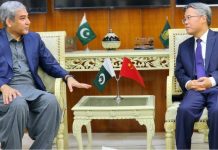Author: Banadi Baloch
The Baloch people, who are the indigenous inhabitants of Balochistan, possess a deeply rooted history and a rich culture characterized by a strong sense of community, love for the land, and expression through language, music, art, attire, and literature.
Balochistan, due to its strategic location and abundant resources, fell under British colonization after the Battle with Mir Mehrab Khan in 1839. Despite Balochistan’s liberation from British rule in 1947, Pakistan forcibly annexed the region in March 1948, effectively maintaining Balochistan as a colony. Under British rule, Baloch land was divided into three parts, each handed over to different countries: Sistan and Balochistan to Iran, Nimroz, Helmand, Kandahar to Afghanistan, and the remainder to Pakistan’s occupation.
Following Pakistan’s occupation, a wave of resistance arose in Balochistan. However, despite efforts of war and resistance, a significant portion of the Baloch population remained influenced by the colonial mentality introduced by Pakistan.
Today, Baloch people often feel hesitant to embrace their cultural heritage in regions like Punjab and feel guilty for speaking their native languages (Balochi and Brahvi). Over the years, colonial tactics have been employed to suppress Baloch cultural events such as funeral customs, neighborly care and hospitality, and marriage traditions.
One significant area where cultural annexation is evident is in Baloch marriages. In traditional Baloch marriages, the groom’s elders visit the bride’s home to formally request her hand in marriage. If the bride’s family accepts, discussions regarding marriage expenses and other arrangements take place during the “HabarBandi” event. Subsequently, the engagement ceremony, known as “Zamati,” occurs where the groom’s female relatives present the bride with a ring, symbolizing the strengthening of familial ties. The marriage ceremony itself involves rituals such as covering the bride with a veil and placing her in a “Jul”, a small area in the house, partitioned by a big cloth sheet. During the Julbandi event, groom’s relatives visit the bride’s house and celebrate the event.
Throughout the celebration, various events mark the progression of the marriage, including “Duzzuki,” where henna is applied to the hands and feet of the bride and groom, and “Henni band,” where guests gather to sing well wishes and apply henna. The marriage culminates with “Sargwapag,” where the bride’s hair is combed in front of guests, followed by traditional songs and Balochi dance called “Chaap”. On the groom’s side, the “Korag” ceremony is performed, and the groom is taken for to the bride’s house where the contract of marriage takes place. The final day, “Mubaraki,” sees the groom’s family and guests congratulating the newlyweds before a feast is held at the groom’s home, symbolizing the bride’s integration into her new family.
However, contemporary Baloch marriages increasingly exhibit influences of colonial culture, with practices such as Haldi, Valima and more are being adopted. This assimilation of colonial traditions is eroding Baloch norms and values, subduing the essence of their cultural heritage.
It is imperative for Baloch individuals to recognize and resist the influence of colonial culture in their traditions. By reclaiming their cultural identity and rejecting colonial practices, Baloch communities can preserve their unique heritage for future generations.
Disclaimer: The views and opinions expressed in this article are those of the author and do not necessarily reflect the official policy or position of The Balochistan Post or any of its editors.






























